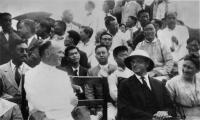Nor did he sympathise with Tewksbury's concern that so many of the delegates did not come into the 'Christian worker' category. 'You cannot standardise the Kuling conference,' he replied. 'The provision for marginal men will keep it from being academic... you can have Peitaiho, but I must keep Kuling.'3
Blackstone - who also by this time had serious, if undisclosed, reservations about Buchman - had still not pledged financial support by the time the conference began and, in his absence, Buchman wrote to his wife declaring that he was quite prepared to do without help from the Stewart Fund. 'I know what it means to live by faith and prayer,' he told her, 'and to be chargeable to no man's silver and gold.' Aware that he was being criticised for extravagance, he also sent Mrs Blackstone a personal cheque to cover anything, including medicine, which could be regarded as personal expenses.4
On the day before the conference opened, Buchman had a full-scale row with Tewksbury about who was running it, and was further burdened by a recent letter from his mother telling him that his father's illness was becoming increasingly serious. He nonetheless sailed full-tilt into a venture where, Sherwood Day being ill and Walter having returned to India, he was taking on a large section of the missionary community almost single-handed.

There were 200 at the first meetings on 5 August. Among them were Hsu Ch'ien, now acting Prime Minister in Sun Yat-sen's absence in Japan; General Wu, another of Sun's senior advisers; and S. T. Wen, former Commissioner for Foreign Affairs, as well as other Chinese and many of the leading missionaries. Their first job, said Buchman briskly, was to find out what real life there was in the conference.5 Such life, he added, was spurious unless it was expressing itself in converting power in the lives of other people. What problem of life, he asked the delegates, who included bishops like Logan Roots of Hankow, did each of them want met during the conference? It might, he said, be a personal problem.
Later the same day, Hsu Ch'ien spoke, and made it clear that he was not interested in pious discussions which did not seek ways of tackling China's moral evils, which he described as 'despotism, militarism, autocracy, opium-smoking, liquor traffic, concubinage, foot-binding and slavery'. 'We have to discover our national sin,' he said, 'otherwise we cannot save our country. If we cannot save the country, we cannot save the world, but the Christians today are powerless in China because of their private sins.'
'I have the salvation of a nation in mind,' Hsu went on, 'therefore I consider this conference a very serious matter. I want to know the method for saving China. The foreign leaders of the church do not quite understand how to save China... we have been too slow. I believe we will save the nation by the direct method, that of personal work.'
62
Photo: Buchman (right) and Bishop Logan Roots of Hankow at the Kuling conference of 1918.
©Buchman Archive/MRA Productions/MRA Productions